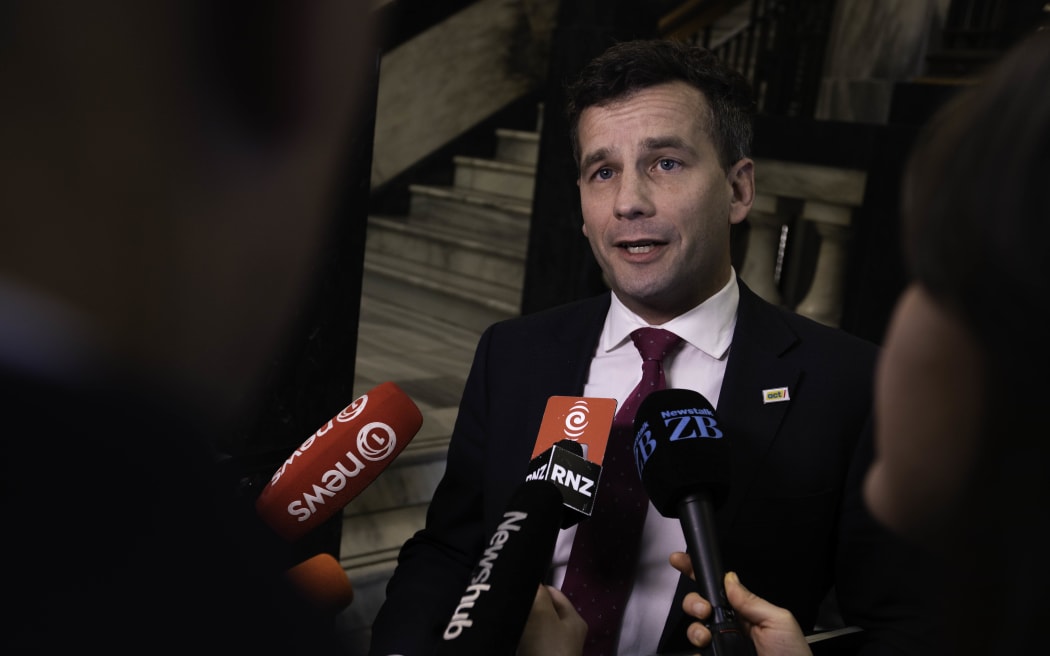
ACT Party leader David Seymour has unveiled a policy that would set a target for New Zealand to be one of the OECD's top-10 fastest growing economies, measured by GDP per capita. Photo: RNZ / Angus Dreaver
The ACT Party says it would prioritise productivity over everything else, if elected.
Its leader David Seymour on Tuesday unveiled a policy that would set a target for New Zealand to be one of the OECD's top-10 fastest growing economies, measured by GDP per capita.
He has also cast doubt on the future of the Productivity Commission under a National-ACT government, and has highlighted the party's policy of selling up to 49 percent of state-owned enterprises.
Seymour said they would aim to achieve the target over 10 or 15 years, through three things: capital investment including direct foreign investment, higher skills via a stronger education system, and innovation.
The party suggested this would be tackled mainly through ACT's other policies, including tax cuts, toll roads, replacing the Resource Management Act with property rights-based law, exempting OECD countries from the Overseas Investment Act, cutting regulations, and more.
"Productivity is something where we measure in generations, or - at the fastest - in growth cycles that can be as long as a decade. Around 1970 New Zealand's productivity was comparable to the middle of the developed world or the OECD. Today, we are 30 percent below the top half of the OECD, we earn significantly less than Australians, Brits, Canadians, Americans countries with which New Zealand has shared histories and likes to compare itself with," Seymour said.
"Meanwhile, we've been overtaken by countries that we used to feel sorry for: Singapore, Lithuania - a former communist country that used to live in poverty is now wealthier than New Zealand in terms of GDP per hour worked."
New Zealand got 23 percent less value out of working hours than Australia, and 41 percent less than America, he said.
"To arrest decades of decline and deliver real change, ACT says we must put productivity at the centre of everything government does," Seymour said.
Higher productivity was the main driver of higher wages and low productivity was bad for everyone, he said.
"It means lower wages for workers, lower profits for businesses, and higher taxes to afford the same public services."
"Actually, every country has had inflation - it's worse than New Zealand because we had low wages and high costs beforehand - our view is that [with] greater productivity, some people will choose to work less.
"There's always possibilities for automation and higher pay, people that are making coffee will get paid more when they have the alternative of moving to a higher paid job elsewhere ... hairdressers haven't become more productive in 100 years but they're paid a lot more than 100 years ago because they have other high productivity jobs they could go to."
Seymour said ACT would require that Cabinet papers ask ministers to consider how policies impacted productivity and economic growth.
"An explicit objective for economic growth will focus the minds of the public service, allow ministers to shoot down anti-growth policies, and ensure voters can hold the government accountable for its performance," he said.
He said the party was still keen to sell up to 49 percent of the remaining equity in state owned enterprises including KiwiRail, Kordia, AsureQuality, NZ Post, Transpower and Kiwi Group Holdings including Kiwibank and its subsidiaries.
"Really, the mixed operating model is about driving productivity. We believe that it's wrong for government, for example ... to give cheap capital to one TV network and leave the other one always in trouble; we believe it's wrong to have KiwiRail with a whole lot of different political objectives."
He argued power markets had not be significantly affected by the mixed ownership model, saying the price was set by supply and demand from the whole market.
"The crown has actually got more in dividends owning 51 percent of partially privatised companies than it was getting from owning 100 percent of state owned ones - and that's got to be a good result."
He suggested Labour had stymied innovation.
"Look, Labour has a suspicion of business that comes through and their rhetoric and their regulatory policy," he said.
"You need a culture of creativity and success. We don't have that right now, particularly for the last six years - the government has run one market study review and regulation regulatory initiative after another, the underlying tone of this message is that somehow, someone somewhere is up to no good."
He was not glowing about National's own approach to selling business as a force for good, however.
"I think National's willing to put any argument that they think will help them get elected... I'm not interested in trying to cajole the other parties. If I thought they were any good, I probably wouldn't be leading my own political party."
The Productivity Commission, set up in 2011 by the then-National government in partnership with ACT - led at the time by Rodney Hide - had been "frankly hijacked" and it was an "open question" whether it should be continued, he said.
"It produced some very useful papers and tools that we would lean on, for example the their work around the regulatory environment, I think would be very valuable to an incoming government. However, the way that the Productivity Commission has been staffed and directed in the last five years means I think it's an open question about whether you would actually continue it."





